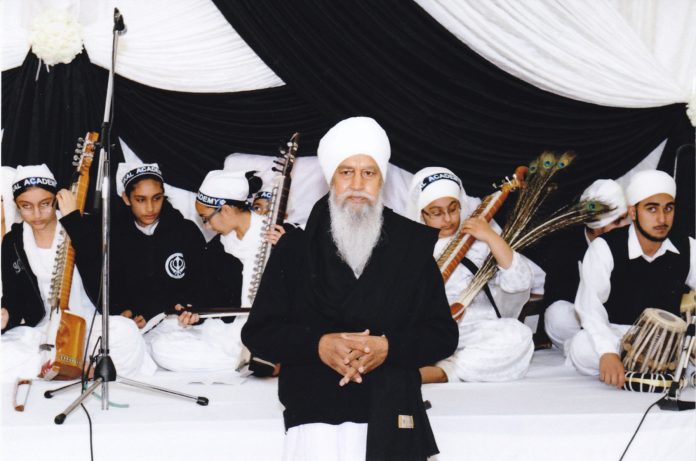
Photo by Chandra Bodalia
FORMER Vice Chancellor of Punjab Agricultural University, Dr. Khem Singh Gill, passed away this week at the age of 89 years.
Born on September 1, 1930, in village Kaleke, Moga, Punjab, in the family of Sardar Lakha Singh and Sardarni Tej Kaur, he was married to Bibi Surjit Kaur and had two sons and one daughter.
The farmers of Punjab admire him for two reasons – one, for his expertise as an agricultural scientist and, two, for his humble and tireless sewa (volunteering) for the cause of uplifting rural education. It is truly difficult, to reckon how many lives have been touched and enriched by Dr Gill’s perseverance and his Midas touch.
True to his name – Khem (in Punjabi means kherra, happiness, bliss), one always found him cheerful. He invariably greeted everyone with a beaming smile. An agricultural scientist of international repute, he dressed modestly donning a white turban and supporting a white flowing beard. One could easily take him as a saint.
While, none of his ancestors either on the paternal side or the maternal side had ever gone to school, Dr. Gill stood first in middle school examination. Sardar Sarwan Singh, Headmaster, Bhupindra High School, Moga, paid ten rupees from his pocket for his college admission. It was he who mentored him to join Khalsa College, Amritsar, for pursuing higher studies in agricultural sciences. This snowballed into a huge contribution to the Green Revolution in India.
Dr. Gill joined Punjab Agricultural University in 1962. He was selected for Rockefeller Foundation fellowship for pursuing a doctorate degree from the University of California, Riverside Campus. He was the only Sikh student with unshorn hair and turban at the campus and always got respect from everyone.
A dedicated plant breeder, Dr. Gill developed more than 30 varieties of different field crops. These include 17 improved varieties of wheat, five high-yielding hybrids and composites of pearl millet, three varieties of linseed, two of sesame, one of barley and two of cluster bean. Of these, nine varieties of wheat and five of pearl millet were released at the national level. Most of these varieties were resistant to diseases like yellow rust, brown rust, Karnal bunt, ergot and / or loose smut.
As the team leader of Wheat Improvement Programme, Dr. Gill did stupendous work on the development and identification of improved cultivars of wheat, which revolutionized wheat production. Another incredible achievement of Dr. Gill is the commercialization of the concept of multiline varieties for the management of wheat diseases especially stripe and leaf rusts. PAU was the first to develop multiline varieties in wheat in India.
He joined as Vice Chancellor of the Punjab Agricultural University in 1990 and played a key role in strengthening research facilities at the Regional Research Stations of the University. ‘Shabash, shabash’ (well done) were his favourite words to encourage his fellow scientists. Anyone, who showed him results, he invariably patted with a ‘shabash’. According to his juniors, this used to be so inspiring that one would go back to work with an invigorated spirit.
Dr. Gill was a Fellow of Third World Academy of Sciences, Italy, Indian Society of Agricultural Sciences, and Indian National Science Academy; President, Indian Society of Genetics and Plant Breeding (1982); Senior Vice President of International Triticale Association, Australia and Brazil; The Genetic Association of India; Founder Member, National Academy of Agricultural Sciences, India; and International Federation for Women in Agriculture; Founder President, Crop Improvement Society of India, etc.
Dr. Gill was decorated with several awards including Padma Bhushan by the Government of India (1993), Rafi Ahmad Kidwai Memorial Prize in 1976, National Professor of Eminence (ICAR), Fellow, Indian National Science Academy, Team Research Award by ICAR, Appreciation Award by United States Department of Agriculture, Washington, FICCI Award, Fellow, Academy of Sciences for the Developing World (TWAS), Medal for Wheat Research and as a Trustee of the Board by the Mexican Government, CIMMYT, Mexico, etc.
Dr. Gill founded the Crop Improvement Society of India. He remained President, Indian Society of Genetics and Plant Breeding, and Vice President of Indian Society of Genetics. He was adviser for wheat, maize and triticale research at the global level, and also had the privilege of being the member of the Board of Trustees and Programme Committee of the CIMMYT, Mexico, and Senior Vice-President of International Triticale Association. Dr. Gill made advanced study visits to 23 countries.
Through the Akal Academies, he started a value-based quality education in rural areas of Northern India.
(From Sarabjeet Singh
sarabjeetsingh@pau.edu)









